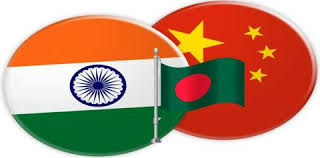My Article published on The EurasianTimes website on 20 Apr 25
On April 17, 2025, Bangladesh and Pakistan held their first foreign secretary-level talks in 15 years in Dhaka, marking a significant step toward resetting bilateral ties: Bangladesh’s Foreign Secretary, Md. Jashim Uddin and Pakistan’s Foreign Secretary Amna Baloch led the Foreign Office Consultations. The discussions covered various issues, including trade, economic cooperation, regional matters, and historically unresolved disputes.
Bangladesh demanded a public apology from Pakistan for alleged atrocities committed during the 1971 Liberation War and sought $4.52 billion as its share of pre-1971 assets from undivided Pakistan. Other issues included the repatriation of stranded Pakistanis and the transfer of foreign aid funds related to the 1970 cyclone. Jashim Uddin emphasised resolving these issues to build a “solid foundation” for relations, while Baloch described the talks as “constructive” and focused on harnessing bilateral potential.
Pakistan acknowledged “outstanding issues” but did not confirm commitments to Bangladesh’s demands in public statements. The talks also explored boosting trade, with Bangladesh highlighting investment opportunities in jute and textiles. Both sides noted a January 2025 MoU for rice procurement from Pakistan. Bangladesh has eased visa restrictions for Pakistani nationals and launched direct shipping links, while Pakistan approved Fly Jinnah, a low-cost airline, to operate between the two countries. Baloch met Yunus and the Foreign Affairs Adviser, Md. Touhid Hossain, discussing the revival of SAARC and regional cooperation. Pakistan’s Deputy Prime Minister and Foreign Minister, Ishaq Dar, is scheduled to visit Dhaka on April 27-28, 2025, the first such visit since 2012, with expectations of signing agreements to strengthen ties further.
For over five decades, the relationship between Pakistan and Bangladesh has been defined by estrangement, rooted in the traumatic 1971 Liberation War, when East Pakistan seceded to form Bangladesh with India’s military backing. The war left deep scars, with Bangladesh accusing Pakistani forces of committing genocide, resulting in an estimated 3 million deaths and widespread atrocities. Under Bangladesh’s former Prime Minister Sheikh Hasina (2009–2024), ties remained frosty due to her government’s focus on war crime tribunals and alignment with India. However, the ouster of Hasina in August 2024, following a student-led uprising, marked a turning point. Under the interim government led by Muhammad Yunus, Bangladesh and Pakistan have embarked on a path of pragmatic engagement, driven by diplomatic, economic, and military cooperation. Unanswered questions include the drivers of this thaw, the challenges ahead, and the implications for South Asian geopolitics, particularly India.
Historical Context: A Legacy of Estrangement
The 1971 war remains the defining fault line in Pakistan-Bangladesh relations. Bangladesh’s narrative emphasises Pakistani military atrocities, including mass killings and the rapes, claims Pakistan disputes. Post-independence, Bangladesh’s early leaders, such as Sheikh Mujibur Rahman, sought to balance ties with Pakistan, attending the 1974 Organisation of Islamic Conference summit in Lahore. However, relations deteriorated after Mujib’s assassination in 1975, as subsequent Bangladeshi governments oscillated between secularism and Islamic identity, complicating reconciliation. During Hasina’s tenure, Bangladesh pursued war crimes trials, executing figures like Jamaat-e-Islami leader Motiur Rahman Nizami in 2016, prompting Pakistan’s condemnation and further straining ties. Visa restrictions, lack of direct flights, and minimal trade underscored the diplomatic freeze, with Pakistani goods often rerouted through third-party ports.
Catalysts for Change: The Post-Hasina Era
The political upheaval in Bangladesh in August 2024, which forced Hasina to flee to India, created a strategic opening for reconciliation. The interim government under Yunus adopted a “friendship to all” foreign policy, distancing itself from Hasina’s India-centric approach and opening doors to Pakistan. This significant shift in Bangladesh’s foreign policy can potentially reshape the region’s geopolitical dynamics.
-
- Political Realignment. Hasina’s ouster reduced anti-Pakistan rhetoric, as her Awami League had leveraged 1971 grievances for political legitimacy. Yunus’s neutral stance prioritises economic and diplomatic diversification.
-
- Strained India-Bangladesh Ties. Hasina’s exile in India and Bangladesh’s demand for her extradition have fueled anti-India sentiment, amplified by the “India Out” campaign in 2024. This has pushed Bangladesh to seek alternative partners like Pakistan to counterbalance India’s influence.
-
- Economic Pressures. Both nations face economic challenges, including high inflation and global trade uncertainties. Bangladesh’s 6% GDP growth since 2021 and Pakistan’s “Uraan Pakistan” plan for 6% growth by 2028 incentivise trade expansion.
-
- China’s Role. China’s strategic partnerships with both countries, including Bangladesh’s participation in the Belt and Road Initiative and Pakistan’s China-Pakistan Economic Corridor, encourage a trilateral alignment, raising concerns in India about the potential shift in power dynamics in the region.
Recent Engagements
Diplomatic Engagement. Diplomatic interactions have surged since August 2024. Yunus and Pakistan’s Prime Minister Shehbaz Sharif met twice—on the sidelines of the UN General Assembly in September 2024 and the D-8 Summit in Cairo in December 2024—discussing trade, cultural exchanges, and regional cooperation, including reviving the South Asian Association for Regional Cooperation (SAARC). A symbolic Eid al-Fitr phone call in March 2025 between the leaders underscored goodwill.
Economic and Trade Cooperation. Bilateral trade grew by 27% between August and December 2024, with both nations targeting a $3 billion trade volume within a year, over four times the current level. In November 2024, direct sea trade resumed after 53 years, with two Pakistani cargo ships docking at Chittagong Port carrying sugar and potatoes. Bangladesh also permitted Pakistani vessels at Mongla Port. Bangladesh scrapped mandatory 100% physical inspections of Pakistani goods in September 2024, reducing logistical costs. A memorandum of understanding signed on January 13, 2025, established a joint business council to boost private-sector ties. Bangladesh eased strict security clearances for Pakistani travellers, while Pakistan waived visa fees for Bangladeshis. Plans for direct flights, which have been absent since 2018, are underway.
Military Cooperation. Military ties have seen unprecedented growth, signalling a strategic shift. In January 2025, a Bangladeshi delegation led by Lt. General S.M. Kamrul-Hassan visited Pakistan, meeting Army Chief General Asim Munir to discuss joint exercises, training, and arms trade. Pakistan described the nations as “brotherly,” aiming to reshape South Asia’s security landscape. Bangladesh’s BNS Samudra Joy participated in Pakistan’s “Aman 2025” naval exercise in February 2025. This was the first major Bangladeshi warship deployment to Pakistan in over a decade, and the exercise focused on countering piracy and illegal fishing. Between September and December 2024, Bangladesh ordered 40,000 rounds of artillery ammunition, 2,000 rounds of tank ammunition, and 40 tonnes of RDX from Pakistan, tripling the previous year’s volume. Reports suggest interest in acquiring JF-17 Thunder fighter jets, co-developed by Pakistan and China, to support Bangladesh’s “Forces Goal 2030” modernisation. Pakistan will begin training Bangladesh’s army in February 2025, with a Pakistani Major General overseeing programs at Momenshahi Cantonment.
Cultural and People-to-People Ties. Shared cultural heritage has facilitated reconciliation, including Urdu-Bengali linguistic ties and a Muslim-majority identity. The 2024 visit of a Pakistani artist to Dhaka and the Bangladesh cricket team’s tour to Pakistan were celebrated as soft diplomacy successes. The “Bay of Bengal Conversation” seminar in November 2024, attended by Pakistani scholars, emphasised Track II diplomacy to rebuild trust.
Challenges to Sustained Engagement
Despite progress, several challenges persist. Bangladesh’s demand for a formal Pakistani apology and $4.2 billion in compensation for 1971 remains unmet, fuelling public opposition in Bangladesh, especially during Victory Day commemorations. While some Bangladeshis welcome renewed ties, others, particularly 1971 war survivors, oppose reconciliation without accountability. Further, Bangladesh’s economic reliance on India and shared counterterrorism goals may constrain its pivot toward Pakistan. Reports of a foiled coup in Bangladesh with alleged ISI backing raise concerns about Pakistan’s intentions, complicating military cooperation.
Implications for India
The Bangladesh-Pakistan thaw could reshape South Asian geopolitics. Given its ties with both nations, it may strengthen China’s regional influence, potentially forming a “trifecta” that concerns India. Unresolved 1971 issues and India’s security concerns may limit the depth of this alignment. India, a key player in Bangladesh’s 1971 independence and a close ally under Hasina, views this rapprochement with alarm. The warming ties threaten India’s influence in South Asia, particularly given concerns over the Siliguri Corridor, the narrow 20-22 km strip connecting India’s northeast.
Prime Minister Narendra Modi met Yunus at the BIMSTEC Summit in Bangkok in April 2025, raising concerns about the safety of the Hindu minority and Hasina’s extradition. India’s High Commissioner Pranay Verma emphasised a “people-centric” approach, advocating for a “democratic, stable” Bangladesh. India has provided Bangladesh $7.862 billion in Lines of Credit to support infrastructure projects. However, it recently terminated transhipment facilities for Bangladesh’s cargo, signalling displeasure.
India has to bolster its 4,096-km border with Bangladesh, deploying technology and increasing Border Security Force inspections to counter infiltration and smuggling. Fears persist that Pakistan’s ISI could transfer weapons to insurgent groups via Bangladesh, threatening India’s northeastern states.
Conclusion
The recalibration of Pakistan-Bangladesh ties since August 2024 marks a significant shift from estrangement to engagement, driven by political changes, economic imperatives, and strategic realignments. Diplomatic, economic, and military cooperation, underpinned by cultural ties, reflects an approach to overcoming historical animosities. However, unresolved grievances, public sentiment, and India’s wary response pose challenges to sustained progress. For India, the thaw necessitates a recalibrated strategy to maintain influence in Bangladesh while addressing regional security concerns. As South Asia navigates this evolving dynamic, the Bangladesh-Pakistan rapprochement underscores the region’s complex interplay of history, geopolitics, and pragmatism. The coming years will test whether this engagement can transcend tactical gains to foster lasting reconciliation.
Please Add Value to the write-up with your views on the subject.
For regular updates, please register your email here:-
Link to the article on the website:-
References and credits
To all the online sites and channels.
Pics Courtesy: Internet
Disclaimer:
Information and data included in the blog are for educational & non-commercial purposes only and have been carefully adapted, excerpted, or edited from reliable and accurate sources. All copyrighted material belongs to respective owners and is provided only for wider dissemination.
References:-
- AP News. “Bangladesh and Pakistan resume talks after 15 years, seek to mend strained ties.” April 18, 2025.
- DW. “How Bangladesh-Pakistan reconciliation impacts India.” December 31, 2024.
- India Today. “Pakistan moves to reset ties with Bangladesh as China factor grows.” April 9, 2025.
- Lowy Institute. “The revival of Bangladesh-Pakistan ties.” February 2, 2025.
- Modern Diplomacy. “Bangladesh-Pakistan Thaw and a Regional Realignment.” February 23, 2025.
- Moneycontrol. “With China in the wings, Pakistan-Bangladesh talks resume after 15 years.” April 17, 2025.
- NewKerala.com. “Bangladesh-Pakistan Ties: Implications for India’s Diplomacy.” February 2, 2025.
- South Asian Voices. “Bangladesh in 2024: Protests, Political Shifts, and a New Path Ahead.” December 19, 2024.
- South Asian Voices. “How Naval Diplomacy Could Rewrite Pakistan-Bangladesh Ties.” April 9, 2025.
- Takshashila Institution. “India-Bangladesh relations – Challenges and Opportunities.” October 22, 2024.
- The Diplomat. “Moonis Ahmar on the Future of Bangladesh-Pakistan Relations.” September 30, 2024.
- TRT Global. “Pakistan and Bangladesh: A thaw begins after decades of frosty relations.” April 16, 2025.
- World Economic Forum. “Pakistan’s path towards sustainable and inclusive growth.” January 21, 2025.



